2010-02-16 : Things on Character Sheets (2)
So here's a fictional character:
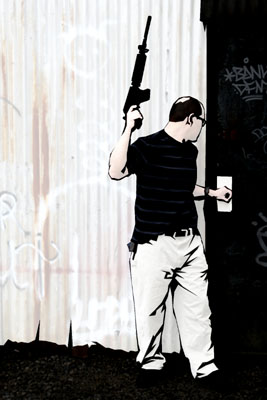
He's got some immediate evident qualities: his gun, his attention to his surroundings, his energy/adrenaline/capacity for violence/will to action, and it looks like maybe he's done this thing more than once before. On his character sheet, this stuff might be stats, rolls to hit and damage rolls, skill checks, armor class, weapon listings. In Ron Edwards' terms, effectiveness.
He's also got some reserves he can draw on or use up: he might fatigue himself, he might get scared or rattled, he might oh I dunno start suddenly to precipitously lose blood. On his character sheet these might be hit points, wound boxes, fatigue levels, maybe endurance checks or saves vs poison. In Ron's terms, resource.
And finally he's got a whole set of qualities that place him and anchor him in his world: who does he answer to, what's his job, whose side is he on? Does he have backup off-camera? If he doesn't make it home tonight, who'll notice? What's his relationship with the people on the other side of that door, and what does he need from them? Is he afraid, greedy, calm, full of righteous anger? On his character sheet, these might be a character class, backstory, training, relationship listings, personality traits, obligations, Beliefs & Instincts, a pool of dice or bonuses the player can spend to say "this guy really cares how this thing turns out, so what he's doing? He's giving it extra." In Ron's terms, positioning.
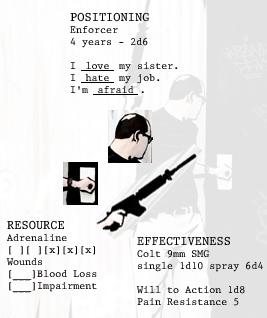
Now, when you design a game, you're designing three sets of relationships, interactions, dynamics. First, the relationships between the fictional qualities the character has and the stuff on his character sheet:
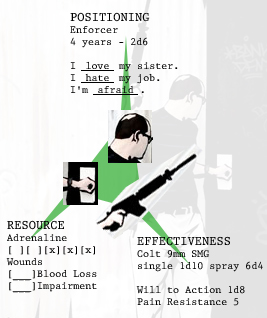
How do your game's rules reflect the fictional stuff? How much detail, and which details? What do your game's rules quantify, and what do they leave qualitative?
Second, the relationships between the things on the character sheet:
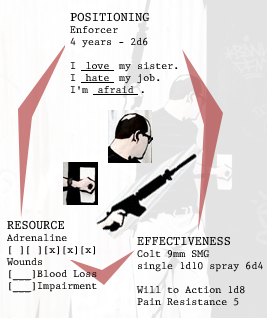
What's the relationship between I'm
and Adrenaline [ ][ ][x][x][x]? If I've got Blood Loss, does that affect my Will to Action? How many thugs must I kill before I go up to Enforcer - 5 years?
In Ron's terms, this is your game's currency.
And finally, crucially, the relationships between the game's mechanical currency and the fictional/real world dynamics that must necessarily prevail:
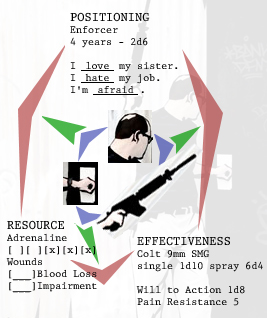
Does your game's currency say what you want it to say?
This is where you take your insight into real human nature - like "it's the person losing the argument who throws the first punch" or "suffering more violence increases a person's capacity for violence" - and give it its expression in your design. This is where you make sure that your game's design supports fiction that is compelling and convincing.
Questions very welcome!
Coming up: currency, reliable (you get what you pay for, you get what you win) vs unreliable (a gamble, an uncertain investment).
1. On 2010-02-16, Robert Bohl said:
This is really interesting and, as usual, I don't fully understand it yet.
What I'm about to say feels like it's touched off by this post, specifically the paragraph about "your insight into real human nature," but I may just be babbling apropos of nothing:
I think I don't agree with most of what you have to say about human nature, but I do enjoy playing your games.
2. On 2010-02-16, Alex D. said:
Interesting.
Gotta re-read this when I'm not at work and can think, but it looks like 2010's shaping up to be a quite interesting year for this blog (and your games! What with Apocalypse World busting it's way out of your brain, and [I hope] Storming the Wizard's Tower waiting on deck).
Thanks for the insight, both in the past and in the future!
3. On 2010-02-16, Vincent said:
Rob: That's think-inducing!
So for you is it a matter of going with it anyway? That's what it's like for me with Misspent Youth - I don't agree with what Misspent Youth has to say about growing up, but I can totally go with it anyway and I love the game.
(I agree with what my games have to say, oh, maybe 80%.)
4. On 2010-02-16, Vincent said:
Notes
You can find Ron Edwards' terms, in his words, here: The Forge :: The Provisional Glossary.
This post follows upon this (quite) old one of mine: anyway: Things on Character Sheets
The illustration is by me, from a stock photo I licensed from dreamstime.com.
I didn't make a point of it above, but currency includes the relationships of components within categories, as well as components between categories - one element of effectiveness to another, for instance, not just effectiveness to resource and effectiveness to positioning.
5. On 2010-02-16, Ben Lehman said:
Re: Rob and Vincent.
Narratives with coherent thematic statements are appealing.
yrs—
—Ben
6. On 2010-02-16, Roger said:
At this point in my life I find myself thinking more about how that artifact came into being, rather than what it looks like in motion during "the game".
Stuff like: How much of that data was generated before play, and how much during play? And for the case of before play, how much by one guy sitting alone, and how much by a guy sitting among the other players?
Also: How much of it, if any, is randomly or procedurally generated? What constraints exist between the various parts, and between the various characters? (What I mean with the last part is: what if one and only one character must be Afraid? Does the game give you any mechanism for resolving that decision?)
Also also, man, that poor schlub doesn't even get a name. There are ephemeral things going on about how a player feels about a character, and they're only rarely mechanized.
7. On 2010-02-16, Vincent said:
Alex: I'm excited for 2010 too.
Ben: Yeppers.
Roger: First point: say more? All that stuff has to be created, it's true.
Second point: Yes! All KINDS of non-mechanized (but systematic!) ephemeral things.
8. On 2010-02-16, John Harper said:
Rob, Vincent: Agreement, feh. Who wants to agree? I want the "insight into human nature" part of a game to make me go, "the hell you say!" It should be controversial, transgressive, provocative, intimate, disturbing. At least one of those.
9. On 2010-02-16, John Mc said:
I just realized that I was thinking of "currency" as being a synonym of "resource". I suppose the term "currency" normally refers to actual physical monies (which are spent to achieve goals) and also to the systems by which money operates (and transforms), I was just thinking of the first definition.
Anyways, interesting stuff. Please continue. :)
10. On 2010-02-16, Sydney Freedberg said:
What I struggled with in various now-discarded or stalled designs is how to link the narrative with the mechanical, besides saying, "this mechanical thing has this label, so you have to narrate accordingly when you use it."
11. On 2010-02-16, Roger said:
To talk more about character generation: I feel like a lot of games fall into the same trap they do with adventure generation—they just tell the player "Alright, now create a character (or adventure) that is interesting."
"Gee, thanks, Game—care to tell me how to go about doing that?"
"You know, *interesting*, you clod."
A lot of games eventually work when you've played them enough times that you learn what's interesting and what isn't, but it seems like there should be a better mechanism than that.
12. On 2010-02-17, Luke said:
Vincent, I think it's very important to note that your mystery man is carrying a Colt M4 or Colt ACC carbine which fires 5.56 mm rounds, not 9 mm. A 9 mm slug would produce problems with recoil and reduce ammunition capacity considerably.
13. On 2010-02-17, Adam B said:
What are the coloured pieces in the last picture? It looks like the blue bits are arrows relating the fictional stuff in the middle and the red bits are arrows relating the currency stuff around the outside, and the green is arrows pointing from the middle to the outside. Do the green arrows only point that one way?
14. On 2010-02-17, Robert Bohl said:
Vincent: Yeah, I kinda do just go along with it. It occasionally causes me emotional stress but who needs to live in an emotional plastic bubble? I don't. Yet.
Anyway, I'm dying to know what you think MY says about growing up. I'm not aware of its saying too much about it.
15. On 2010-02-17, Vincent said:
More Ben: "Narratives with coherent thematic statements are appealing."
I think it's interesting that this stuff I'm talking about - suffering violence makes you capable of more violence, eg - is part of the architecture of thematic coherence in the players' narrative, it's not so much part of the thematic statement.
John H: Yeah, okay. "Provocative" sells me on it.
John Mc: Cool!
Resource is only as interesting as, oh, anything else is. Currency, though - the relationships between things, how changes here become changes here - that's design.
16. On 2010-02-17, Vincent said:
Sydney: Crucial! Thank you for saying that. I think that's one of the ongoing and outstanding crises in rpg design.
I want to draw a picture of the problem and propose a solution, but the picture in my head is 3D. I'll have to figure out how to talk about it.
Roger: Oh, absolutely. Yes.
Luke: Dammit. I was plain guessing, but I hoped that if I stated my guess with enough assurance, nobody would call me on it.
17. On 2010-02-17, Gregor said:
Hey, if it was the 9mm SMG it would have less recoil and be more accurate I think. But I agree with Luke, the clip fingers it as 5.56 (M4 Carbine?).
I find coherent Positioning between all the characters in a group the difficult thing that was missing for a lot of my gaming.
18. On 2010-02-17, Vincent said:
Adam: Great! Okay.
Yes, the red shapes are relationships between mechanical elements. Mostly they're rules, things like these:
- When an attacker lands a hit on your character, mark off wound boxes according to the attacker's weapon's damage.
- When you go up from warrior level 2 to warrior level 3, you get 2d6 HP and +1 to your Brawn, and if your character serves a king, the king will grant you land.
- Each time you mark a new adrenaline box, roll an additional die into your Will to Action pool.
The blue shapes are relationships between fictional things, yes, but more: they're your basic suppositions about how things work, across the range of fiction that your game allows. You can state them as rules too, but not mechanical ones:
- A more experienced fighter's greatest advantage is that he's better able to keep his cool.
- People under increasing stress act increasingly unpredictably.
- Wizards are powerful, but they get their power by defying God.
This is a different thing than "the fiction" that I usually talk about. Usually when I talk about the fiction, I'm talking about the current, live fiction that the players are creating right now. Not today! Today I'm talking about all the possible fiction that your game can create. You're the designer of it: how should it work?
(We used to call this the game world, conflating a game's setting with the structure of its causality.)
Finally the green shapes: I've drawn them one-way, yeah. That's how they are when you're designing a game - they're the relationship between your game's rules and, essentially, the way you think your game should work.
- A more experienced fighter's greatest advantage is that he's better able to keep his cool, and when you go up to warrior level 3 you get more HP, +1 Brawn, and maybe some land. Is this a good match?
- People under increasing stress act increasingly unpredictably, and each time you mark a new adrenaline box, roll an additional die into your Will to Action Pool. Is this a good match?
- Wizards are powerful, but they get their power by defying God. Do your rules for wizards make this true? (Ars Magica's almost do, but don't.)
In play, the green arrows reverse direction, and your rules impose a structured causality upon your game's fiction. If they were a good match in design, then in play the game works the way you meant it to. If they were a bad match in design, then in play the game doesn't work how you intended. Bold barbarian warriors maximize their armor and when they go into battle it's a matter of grinding ablation, not decisive action; your grim & gritty noir detective has to carry an assault rifle because a .38 won't kill a dude; the team of morning-cartoon superheroes bicker, bean-count their resources, and wind up working for the highest bidder.
Make sense?
19. On 2010-02-17, Vincent said:
Rob: Misspent Youth is all "when you grow up, you either keep to your youthful ideals or you trade them away for shit." Confrontations with ugly reality - that is, growing up - can't mature your ideals into better ones, only compromise them.
20. On 2010-02-17, Sydney Freedberg said:
On struggling to link the fiction and the mechanics at a level beyond "narrate this appropriately" ("one of the ongoing and outstanding crises in rpg design," in Vincent's words):
For me at least, the problem is the appeal of universal and unified mechanics. Universal is not the same as unified, mind, but pursuing either, especially in combination, seems to push towards designs where, say, "I can hit you with a rock real good +2d6," "I am a member of the Cabot family +2d6," and "I have a cool car +2d6" all have the same mechanics: you can invoke them in the same range of situations, you determine success or failure in the same way, and success or failure has the same range of consequences. HeroQuest is especially fond of this. Dogs in the Vinyard actually does a great deal to make these things different, and different in a way that strikes to the moral heart of the game, but even Dogs leaves you room to trip yourself up.
21. On 2010-02-17, Vincent said:
Sydney: Yep. Full agreement here.
Also at fault: reliable currency (you get what you pay for, you get what you win). Coming up!
22. On 2010-02-17, Matthijs said:
Post 18 made the whole thing clear to me, at least.
Vincent, I'd love to hear how you'd apply this to more freeform-style games. Specifically, would you say freeform games have currency?
(I know "freeform" is a vague and horrible term).
23. On 2010-02-17, Matthijs said:
Post 18 made the whole thing clear to me, at least.
Vincent, I'd love to hear how you'd apply this to more freeform-style games. Specifically, would you say freeform games have currency?
(I know "freeform" is a vague and horrible term).
24. On 2010-02-17, Vincent said:
Matthijs: I would absolutely say that freeform games have currency, yes! For any and all values of "freeform," even the vaguest and most horrible.
If I draw a distinction between systemic and mechanical, you get what I mean, right? System is what the players are actually doing to play the game, which may or may not be written down, and may or may not include mechanics, but it still exists, right? So freeform games have systemic currency, not mechanical currency - I have no qualms about that whatsoever.
25. On 2010-02-17, Vincent said:
Ah, here's a quick and dirty:
Characters take effective actions that (a) deplete, restore, build, or otherwise change their resources, and (b) change their circumstances, sometimes only immediately, sometimes profoundly. Characters' resources (a) provide breadth and depth to their ranges of effective actions, and (b) can also change their circumstances, immediately and/or profoundly. Characters' circumstances, of course, (a) constrain and provoke their effective actions, and (b) can change their resources.
A warrior kills his enemies, gaining experience and looting their wealth, but suffering exhaustion and wounds. For a while he's able to stay ahead of the curve - his experience does him more benefit than his wounds hamper him - but that time comes to an end. He uses his accumulated wealth to buy a wife and a home, and he turns his battle-cultivated experience to politics, to good effect. Now he's mayor.
Cycles of effectiveness, resource, and positioning, all trading off one into the next. That's currency. (So however it happens in play, that's your game's systemic currency, whether you have character sheets or dice or whatever or none.)
26. On 2010-02-17, Robert Bohl said:
Misspent Youth is all "when you grow up, you either keep to your youthful ideals or you trade them away for shit." Confrontations with ugly reality - that is, growing up - can't mature your ideals into better ones, only compromise them.
But you can mature your ideals into better ones if you have a happy ending. Maybe that's not clear.
Anyway, thanks. Didn't want to turn this into an ego thing .
27. On 2010-02-17, Vincent said:
Rob: Sure! (We can have it out in real life sometime if you want. I don't think it matters, at all, to anything.)
28. On 2010-02-17, Vincent said:
Gregor: Say more about coherent positioning between the characters? I'm not sure what you mean.
29. On 2010-02-17, Matthijs said:
(Sorry about the double post! My post didn't show up in the thread after submission, for some reason).
I'm going to have to think about the freeform currency thing. My feeling right now is that it might be there - but since it's not explicit and/or quantified, it's a wobbly sort of currency. (Less like a modern bank, more like a pre-money economy of "give me two chickens and the use of your mountain pass in spring".)
I'm guessing that the flow of freeform currency is often much easier to see in hindsight. The laws of drama that the group uses in practice - the system - probably says a lot about that group's (or that campaign's) view of the world and humanity. It'd be interesting to look back on a couple of campaigns and try to analyse what actually happened, currency-wise.
30. On 2010-02-17, Gregor said:
OK, when I think back to early games that I played a lot of (Red Box D&D and Dragon Warriors) there was I think a lot of Positioning for our characters. We were a party of fighters and thieves with the odd magic user or demi-human. We had character classes and obligations that came with them, and expectations of what we were supposed to do (in the party and in the imagined game world). I also think the Positioning between our characters was pretty coherent. Our characters "fit" together if that makes sense? That maybe lasts up to 1992, when I finished running Cyberpunk and a long campaign of Pendragon.
Then I chose to play games where Positioning had become less clear, more haphazard, and when it did exist it was incoherent between characters (it wasn't thumping to the same beat). The characters didn't fit easily together. In those games I can clearly see where our characters had (often "balanced") Resource and Effectiveness, and the games had often detailed mechanics for linking those two. But Positioning didn't relate to those two things well (if at all), and what positioning characters did have varied widely in content and tone.
In the place of Positioning we perhaps had colour, but it wasn't the colour that informed or affected anything in the fiction, really. ("Colour" that could do that would have had to be a Resource or Effectiveness in those games.) Does that make sense?
31. On 2010-02-17, Joshua A.C. Newman said:
tl;dr
32. On 2010-02-17, Adam B said:
Thanks, Vincent!
Rereading the original post with the idea that it's specifically about design makes it all way clearer. And now I'm starting to see how "you should design your game to say something about human nature" isn't some vague philosophical idea, it's something you can point right at during the design process.
33. On 2010-02-17, Vincent said:
Gregor: Ah yes, totally. With you.
Joshua Razzn frazzn why I oughta...
Adam: Cool. Yep.
34. On 2010-02-18, Josh W said:
I really dislike "currency" as a term, but my version is really long: "rules embodied intra-character causality"!
It reminds me a bit of Wittgenstein and his approach to sentences; the words stand for things, whatever, but the relationships between the words in a sentence allow you to put the relationships between those things right up in front of the person listening:
You can call one stat "wearyness" and another "hope", but it's the way that they interact in your that tells someone what you think about their relationship. Or rather, it tells you what their relationship could be, because languages or games are not required to match the real world, obviously!
In fact that's one cool thing about playing a game you disagree with; showing how it isn't the structure of the real world in a way that's still fun, trying to do the deconstruction-reconstruction trick without the car crashes.
Gregor that sounds pretty familiar to me; just have two people in the group called "the greatest swordsman" or "the only survivor of the disaster" and you can see it in action! You can put limits on admissable positioning, (ration it/make compromises/put limits for everyone) or you can allow that positioning to become false, an illusion, a first draft etc. So the swordsmen constantly compete, and the two survivors talk about their experience etc.
Alternatively you can avoid ever mentioning that problem, and just avoid expressing those elements of the character, which generally pleases no-one!
RSS feed: new comments to this thread
This thread is closed to new comments.
home: anyway.
newer thread: 2010-02-18 : Currency - Spanning Divide and Range
older thread: 2010-02-15 : Apocalypse World publication plans



















